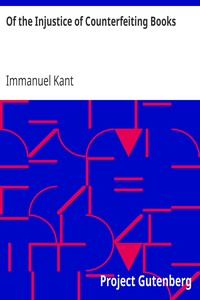Of the Injustice of Counterfeiting Books by Immanuel Kant
"Of the Injustice of Counterfeiting Books" by Immanuel Kant is a philosophical treatise written in the late 18th century. This essay explores the ethical and legal implications of counterfeiting books, arguing against the practice and emphasizing the moral rights of authors and editors in relation to their published works. Kant investigates how the publication of a book constitutes a unique form of business that requires the author’s express consent, distinguishing it from
other commodities. In this work, Kant presents a structured argument to defend the position that counterfeiting is inherently wrong, asserting that a counterfeiter intrudes upon the rightful business of another without any legal or moral justification. He discusses the nature of authorship and the editor’s role, stating that when an editor publishes a work, he does so in the name of the author and, as such, owes a responsibility to protect that author’s rights. Kant further argues that the ownership of a copy does not grant the purchaser the right to publish or reproduce the work, thereby elucidating the distinct legal rights associated with authorship versus ownership of physical copies. He concludes by advocating for a formal legal protection of authors against counterfeiters, suggesting that clarity in copyright law would support the just interests of authors and editors alike. (This is an automatically generated summary.)
Read now or download (free!)
| Choose how to read this book | Url | Size | ||||
|---|---|---|---|---|---|---|
| Read online (web) | https://sendtokindle.compellingsciencefiction.com/ebooks/46060.html.images | 52 kB | ||||
| EPUB3 (E-readers incl. Send-to-Kindle) | https://sendtokindle.compellingsciencefiction.com/ebooks/46060.epub3.images | 90 kB |
Send
to kindle email: |
|||
| EPUB (older E-readers) | https://sendtokindle.compellingsciencefiction.com/ebooks/46060.epub.images | 88 kB | ||||
| EPUB (no images, older E-readers) | https://sendtokindle.compellingsciencefiction.com/ebooks/46060.epub.noimages | 71 kB | ||||
| Kindle | https://sendtokindle.compellingsciencefiction.com/ebooks/46060.kf8.images | 227 kB | ||||
| older Kindles | https://sendtokindle.compellingsciencefiction.com/ebooks/46060.kindle.images | 217 kB | ||||
| Plain Text UTF-8 | https://sendtokindle.compellingsciencefiction.com/ebooks/46060.txt.utf-8 | 41 kB | ||||
| Download HTML (zip) | https://www.gutenberg.org/cache/epub/46060/pg46060-h.zip | 87 kB | ||||
| There may be more files related to this item. | ||||||
About this eBook
| Author | Kant, Immanuel, 1724-1804 |
|---|---|
| Title |
Of the Injustice of Counterfeiting Books
From: Essays and Treaties on Moral, Political and various Philosophical Subjects |
| Note | Reading ease score: 38.2 (College-level). Difficult to read. |
| Credits |
Etext produced by John Mamoun.
HTML file produced by David Widger |
| Language | English |
| LoC Class | K: Law in general, Comparative and uniform law, Jurisprudence |
| Subject | Copyright |
| Category | Text |
| EBook-No. | 46060 |
| Release Date | Jun 21, 2014 |
| Most Recently Updated | Jan 26, 2021 |
| Copyright Status | Public domain in the USA. |
| Downloads | 162 downloads in the last 30 days. |
| Project Gutenberg eBooks are always free! | |

